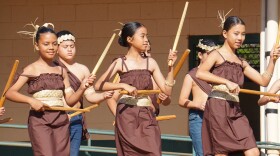Hawaiian musician Kalani Peʻa returned home to Maui this week after winning his third Grammy Award in the Best Regional Roots category for his album “Kau Ka Peʻa.”
Hawai'i Public Radio caught up with Peʻa upon his return from Las Vegas to hear about what this award meant — and what he has in store next.
"A haʻalele wau i kēlā ʻāwai Wehi a uē wau. A uē wau no koʻu hauʻoli ma ka hoʻomau a nokenoke ʻana i ka mea e pono ai i ola kākou ma nā ʻano mea like ʻole. Ma ka hoʻōla ʻana i ka ʻōlelo Hawaiʻi, ma ka hoʻōla ʻana i ka moʻomeheu Hawaiʻi."
It was an emotional win, says Peʻa, who cried tears of joy as soon as he left the stage Sunday. He sees the victory as a symbol of Native Hawaiian progress and perseverance in the face of struggles to perpetuate the Hawaiian language and culture.
Peʻa says the Grammy Awards are an opportunity for him to share not only Hawaiian music but a Hawaiian worldview on a global platform.
"ʻOiai ma ke Grammys ʻuʻuku wale nō kākou. Ke komo ma kēia ʻano hana kūpaianaha. ʻIke lākou o ʻōlelo Hawaiʻi lākou, no ke aha ʻoukou e hīmeni ai i ia mau mele Hawaiʻi i pili i kou ʻāina, pili i kou lāhui. Ma laila nō au me koʻu ʻohana me kaʻu mau puʻukani e hoʻonaʻauao aku iā lākou."
Because there are few Hawaiians at the Grammys, Peʻa says they're often a focal point of curiosity and he is often looked to as a resource on all things Hawaiians.

Peʻa made Grammy history this year when the Recording Academy invited him to sing “Dance to the Music” alongside other nominees in the opening sequence of this year’s show.
"Ma hope o 64 makahiki, 64 makahiki a noi ʻia wau a ua pā kuʻu naʻau. Hīmeni wau i ia mele Motown “Dance to the Music” me kēia mau kanaka kaulana. ʻAʻole i noi ʻia kekahi Hawaiʻi e kau ma kēlā pā a hīmeni a ʻōlelo i kekahi mau huaʻōlelo Hawaiʻi a i kēlā pō."
He says he’s unaware of any Native Hawaiian being asked to sing on stage in the show's 64-year history. He took advantage of the opportunity to sneak in a little ʻōlelo Hawaiʻi.
Peʻa is gearing up for his May Day show at the Hawaiʻi Theatre in Honolulu. He’s planning a two-month world tour this summer and a Christmas album is also in the works.





